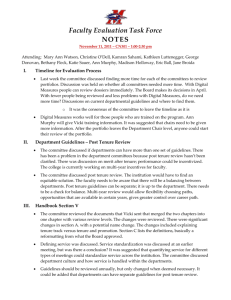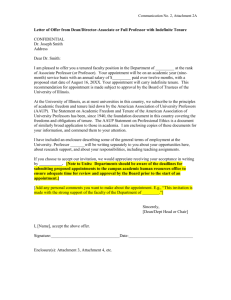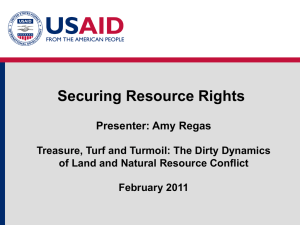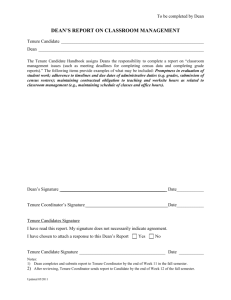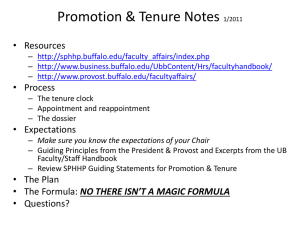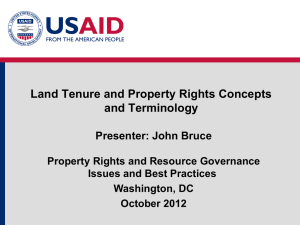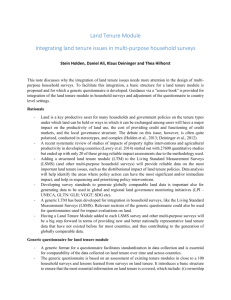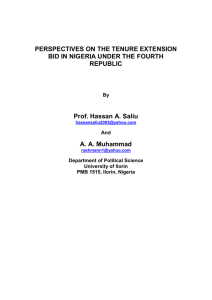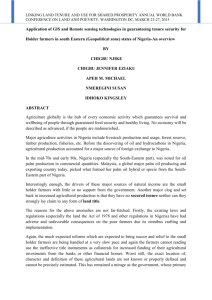Surviving and Thriving in Academia
advertisement
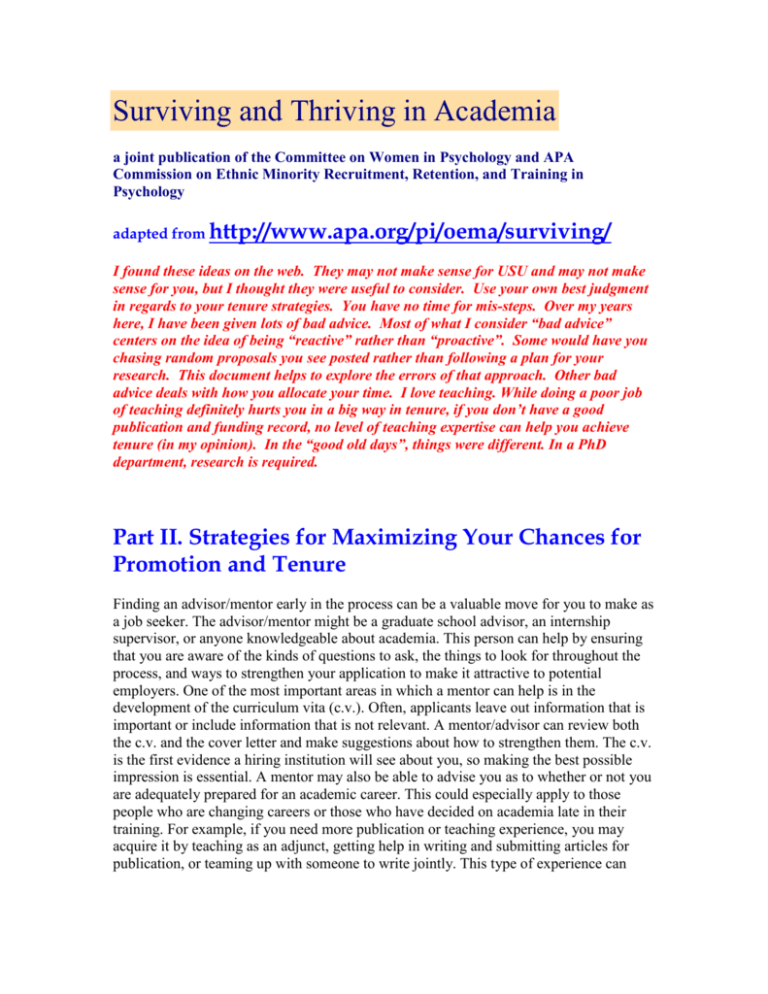
Surviving and Thriving in Academia a joint publication of the Committee on Women in Psychology and APA Commission on Ethnic Minority Recruitment, Retention, and Training in Psychology adapted from http://www.apa.org/pi/oema/surviving/ I found these ideas on the web. They may not make sense for USU and may not make sense for you, but I thought they were useful to consider. Use your own best judgment in regards to your tenure strategies. You have no time for mis-steps. Over my years here, I have been given lots of bad advice. Most of what I consider “bad advice” centers on the idea of being “reactive” rather than “proactive”. Some would have you chasing random proposals you see posted rather than following a plan for your research. This document helps to explore the errors of that approach. Other bad advice deals with how you allocate your time. I love teaching. While doing a poor job of teaching definitely hurts you in a big way in tenure, if you don’t have a good publication and funding record, no level of teaching expertise can help you achieve tenure (in my opinion). In the “good old days”, things were different. In a PhD department, research is required. Part II. Strategies for Maximizing Your Chances for Promotion and Tenure Finding an advisor/mentor early in the process can be a valuable move for you to make as a job seeker. The advisor/mentor might be a graduate school advisor, an internship supervisor, or anyone knowledgeable about academia. This person can help by ensuring that you are aware of the kinds of questions to ask, the things to look for throughout the process, and ways to strengthen your application to make it attractive to potential employers. One of the most important areas in which a mentor can help is in the development of the curriculum vita (c.v.). Often, applicants leave out information that is important or include information that is not relevant. A mentor/advisor can review both the c.v. and the cover letter and make suggestions about how to strengthen them. The c.v. is the first evidence a hiring institution will see about you, so making the best possible impression is essential. A mentor may also be able to advise you as to whether or not you are adequately prepared for an academic career. This could especially apply to those people who are changing careers or those who have decided on academia late in their training. For example, if you need more publication or teaching experience, you may acquire it by teaching as an adjunct, getting help in writing and submitting articles for publication, or teaming up with someone to write jointly. This type of experience can often make you more competitive. A good mentor/advisor can be invaluable in this process. Sometimes, people decide to seek a position in an academic setting after working in some other setting for several years. For instance, you may have worked in a clinic, hospital, or organization where you functioned as a clinician, administrator, or director of training, doing some writing and research activity or occasional teaching. Although entering a career in academia involves addressing the particular requirements of this career path (research, publications, teaching experience), previous experiences can also be an asset to the academic department. It is important to frame the descriptions of previous experiences so that the department will recognize your potential contributions. A mentor/advisor can be very helpful in this process. Each college or university has its own set of written rules governing many aspects of academic life. There are also unwritten rules that, together with the written ones, constitute the culture of the institution. Criteria for tenure and promotion are often not explicit or clear, and there may be unwritten rules which are not uniformly applied across all units (Ross, 1987). As a new member of the community, one of the most important tasks you face is determining not only what the rules are, but also how they are applied. The application of rules is as important as the rules themselves. Also, understanding political aspects of decision making in your department, which are not openly discussed is valuable to your success. The decisions regarding faculty life in your department will have both intellectual and political components. If you think about the decisions surrounding your own dissertation and the composition of your dissertation committee, you get a sense of the kinds of issues that will operate in your hiring and subsequent promotion and tenure processes. Some of the discussion to follow describes the most demanding criteria for promotion and tenure-those commonly found at research universities. As suggested in Part I, you should identify the criteria you will be facing. Although almost all academic institutions consider teaching, research, and service as criteria for promotion and tenure, institutions vary widely in the importance they place on each category. Teaching is not considered by most research universities to be the most important work, and often tuition produces less income than research dollars. In such institutions, faculty who have demonstrated excellence in teaching, but have published little may be denied tenure, promotion, and merit pay. Thus, you will have to concern yourself with doing all three of these things proficiently and allocating time and effort in proportion to the priorities of the department within your institution. In addition to your performance in these three areas, all departments are concerned with the issue of fit. Fit is the degree to which your contributions in the areas of research, teaching, and service are central to the needs of the department. While fit has always been a criterion for hiring, some institutions have recently started to place it overtly in the list of criteria for promotion and tenure. A component of fit which is often unstated but which plays a part in decisions is collegiality. While Webster defines collegial as "marked by power or authority vested equally in each of a number of colleagues," collegial has taken on another meaning that has more to do with the judgment of colleagues that both you and your work are in harmony with the department's needs. Definitions of collegial behavior are idiosyncratic, however, so the same behavior may have different implications for different individuals within a department. In addition, colleagues may replicate the behavior of managers in nonacademic settings. According to Landau (1995), both race and gender are related to managers' ratings of promotion potential, even when controlling for age, education, tenure, salary grade, functional area, and satisfaction with career support. Females are rated lower than males, and African Americans and Asian Americans are rated lower than Whites. Landau found no interaction effects, indicating that the effects for race and gender had additive effects for ethnic minority women. The expectations for collegiality are defined by the general climate of the department. For example, departments with an active social life may demand more contacts beyond the work setting than those in which such relations do not occur. Collegiality is one aspect of your performance in which the informal rules that set the climate of your department are very important. Once you have accepted a position at an institution, you will find the following strategies for promotion and tenure helpful. The strategies will be broken into six parts: Information and Resources, Teaching, Research and Publishing, Service Commitments, Relationships, and Evaluations. Weightings generally: research/scholarship + teaching + service proportionate to: academic & assigned activities: reported, recognized (e.g. DOAD) [need performance evaluation] Full Time/GFT vs. Part-time Level of promotion: more stringent for higher ranks (Assoc to Full Professor > Lecturer to Assistant Prof) relative to your contributions to your discipline over time at present rank Letters of support from outside reviewers are vital for the tenure committee. The committee often asks the candidate for a list of outside reviewers, so develop your list early through networking. Try to be sure that everyone on your list has met you. Go to section meetings and meet the senior scholars in your field. Talk to people at ASAs who present papers in your area. SWS, of course, offers great networking possibilities. Every time someone says something good about your work, put that person’s name in an “outside reviewer” file that you can go back to when developing your list. When you send your work to outside reviewers, be sure the articles show the breadth and depth of your main work so they can write the best letters possible. When considering opportunities for research, teaching, and particularly service, constantly ask yourself, “Will this count for tenure?” A good knee-jerk reaction to any request should be, “I will think about it.” Never say yes off the bat, no matter what it is. You need to be a good departmental citizen, but you can try to arrange your service work to be visible, yet less time consuming. If your chair or other seniors are allies, they would be good people to ask if you should accept a service request. Faculty members receive many review requests, but try to do only one article review a semester, no more than one book review per year, and be sure they are right in your area. You can say no to review requests, especially if you already have one on your desk. Reviewing can be good because it reminds you how to make a good argument. Also, if you are publishing in that journal, it is wise to stay in the editor’s good graces. Keeping your tenure materials organized throughout your junior years is important. Keep records of everything you do! For example, include the committees you serve on, students you advise, and talks you give. One way is to keep three folders of records – one each for research, teaching, and service. Early in your new job, you also want your colleagues to have a good perception of you. New faculty members are labeled very early as people who will get tenure or not. David Wood: (Wisconsin)

